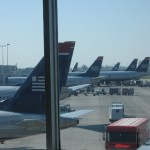Hilton or Starwood? Not even a close call
How do you decide which hotel to choose in the city you are visiting if you want to redeem your points for a free night? I had to make that decision this month, and unlike in many similar situations, it wasn’t even a close call.
I usually start with the chains where I have top elite status — Hilton HHonors and Starwood. Hilton’s Diamond benefits are inferior to Starwood’s Platinum perks — Hilton doesn’t give you suite upgrades and free Internet. The only advantage with Hilton is that award stays count toward elite status, which is rather significant in my book…










